After Months Of Protests, Hong Kong Heads To The Polls
After months of anti-government protests, Hong Kong headed to the polls in record number.
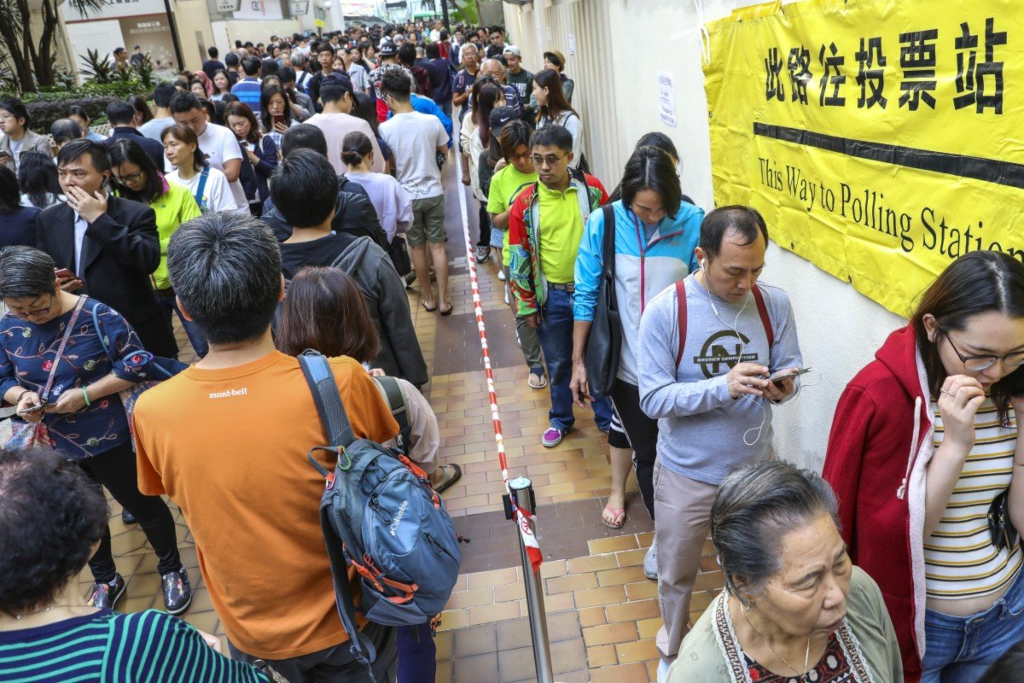
It’s been some time since we’ve taken a look at what’s going on in Hong Kong, but the protests that began there in the spring as a protest against a controversial extradition law have continued and have widened into a standoff between the central government in Beijing that wishes to increase its control over the city and residents who want to preserve their liberties. In the past several months, the protests have grown more prevalent even as the police have become even more violent. In a move that could obviously increase the risk that Beijing could decide to intervene in a more direct manner, the protesters have also responded more violently, with weapons such as Molotov Cocktails and other attacks, many of which have left individual police officers injured.
It’s in the context of those protests that residents of Hong Kong headed to the polls today in elections in which the issues central to the months of protest have been front and center:
HONG KONG — After months of antigovernment protests in Hong Kong, voters on Sunday had a chance to voice their opinion on the city’s future — albeit through an election for a group of local officials who mainly deal with noise complaints, bus stop locations and neighborhood beautification projects.
The district council is one of the lowest rungs of Hong Kong’s elected offices. It is usually a quiet affair focused on community issues.
But in the midst of the increasingly violent protests that have divided the city, the race took on outsize significance and drew record-setting throngs of voters to polling places on Sunday.
The city was calm through the early afternoon, as democracy advocates appeared to focus on participating in one of the few elections that Beijing allows in the territory under its sovereignty.
The vote was the first test of whether the protests could transform public anger that has led millions to take to the streets into actual votes, or whether the populace had grown weary of acts of civil disobedience that have snarled transportation and forced the closing of schools and businesses.
“Politically speaking, the battle of the district councils as a whole is a crucial battle in taking control,” said Eddie Chu, a pro-democracy legislator who is also running for district council.
The linked article from The New York Times has a detailed look at what’s at stake in these elections, as does The South China Morning Post:
Nearly 3 million Hongkongers voted in Sunday’s district council elections, the record-breaking turnout sending a peaceful but powerful signal of their demand for a say in the politics of their protest-rocked city.
Voter turnout was confirmed at 71.2 per cent of 4.1 million registered to vote, compared with 47 per cent in the 2015 polls, and far surpassed the record of 58 per cent set in 2016’s Legislative Council elections, where at least 10 localist candidates were elected.
Ballots were being counted as soon as polling ended at 10.30pm, with final results expected in the early hours of Monday, although disputes could delay the outcomes in several keenly fought districts. But all indications were that there would be a significant shift away from the pro-establishment camp that had dominated the district council landscape for years. Shortly before 1am, it was announced that the overall turnout was 2.94 million.
Signs of a struggle to retain their vote share emerged as early as 11am when candidates in the camp often dubbed as pro-Beijing and allies of the government began issuing emergency calls for votes to boost their chances.
There were also predictions that several high-profile lawmakers, double-hatting as district councillors and in marginal seats, could be dislodged from their council perch.
As rumours spread over the weekend that election officials would use a ruse to end voting prematurely, calls grew online for early and orderly voting, mobilising thousands to descend onto the more than 600 polling stations across the city and the outlying islands. Queues began forming as early as 6.30am, and a significant number of overseas Hongkongers and those in mainland China made the trek home to cast their ballots.In Tai Kok Tsui, Evan Wong Leung-fung, 23, was among the first to vote. “I woke up so early to discharge my duty as a Hong Kong citizen and I chose to come to the polling station because of the rumours,” he said. “Although the government has made a clarification, I still played safe.”
Constitutional and mainland affairs minister Patrick Nip Tak-kuen acknowledged the rumours that trust in the government was low, an admission of the disconnect between the administration and citizens over the past six months of the unrest.
Taking place amid the protest crisis and worsening violence, which culminated in a siege at Polytechnic University last weekend, the elections attracted the global media’s attention. Many led their bulletins on the polls, never mind that these are for the lowest tier of administration in the city.
While these elections are for the District Councils spread throughout the city-state rather than the far more powerful City Council, they have been taken by both supporters of the central government in Beijing and the protesters as a proxy for the political battles that have divided Hong Kong for the better part of the year. Each side has used the elections to motivate its supporters to make a mark that will be interpreted by much of the world as measure of the support that the anti-Beijing forces actually have in the city. In that respect, the protesters are hoping that the elections will be seen as a sign that the general public is still with the protesters and place further pressure on the leadership to accede to the protester’s demands. 4
All of this began roughly nine weeks ago now when residents began taking to the streets to protest an extradition bill under consideration by the city’s legislature. With good cause, the protesters feared that if it became law the bill would make it easier for the government in Beijing to extradite Hong Kong residents and foreigners to mainland China. This would be significant, of course, because on the mainland these people would be without the civil liberties protections they ha pursuant to the 1997 agreement that returned Hong Kong to Chinese control. That agreement roughly abides by the “one country, two systems” idea that former Chinese leader Deng Xiaoping advanced during his time in power. Initially, the city government responded to the protests by suspending consideration of the bill, but that wasn’t sufficient for protesters who continued their protests until the government relented by formally pulling the bill from consideration.
It quickly became apparent, though, that this wasn’t sufficient and the protesters have expanded their demands to include the removal of several key city officials. The protests expanded at that point, bringing more people to the streets, and also appeared to have become violent, largely in response to harsh measures by city police and what appear to have been the actions of provocateurs. By that point, even the leader of Hong Kong declaring the extradition bill dead wasn’t enough for the protesters, who have continued to take the streets in smaller protests during the week and large ones on the weekends. The most recent protest took the form of a largely successful General Strike that may be repeated on October 1st when China marks the anniversary of the founding of the Chinese Communist Party. The recent shift of the attention of protesters from the streets to the airport is, no doubt, an effort to bring international attention to their movement while at the same time continuing their protests in the streets.
All of this has obviously tested the patience of the leadership in Beijing. So far, while the police in Hong Kong have on occasion used tear gas and batons to break up protests, things have been relatively restrained compared to how they would likely react if the protests were taking place anywhere else in China. As noted in the article linked above, the protests have veered into calls for independence at times, and in some cases included the flying of the pre-1997 flag that was flown when the city was under British rule. Obviously, independence is something that Beijing is not going to allow, and the more the protests move in that direction the higher the risk becomes of some kind of punitive action from the mainland will be notwithstanding the fact that it would take place before the world’s television cameras. Already there are reports of a military buildup in the mainland territory bordering Hong Kong, raising concerns that intervention could come without any warning.
As I have said before, Beijing has good reason to give Hong Kong latitude even in the face of these protests:
Another factor motivating China to restrain itself in Hong Kong, of course, is the fact that the leadership is wise enough to know that doing so would be a disaster both in terms of the widespread coverage it would receive from the western media, which is well-established in the city, and internationally. Even in this era where prosperity is becoming more widespread in China a whole, Hong Kong remains the goose that laid the golden egg and the leadership in Beijing is obviously too smart to mess that up. There’s always the possibility that they will lose patience in one of these situations and that they will overreact to the protests in Hong Kong as they did in Tiananmen. At that point, though, they may find that they’ve bitten off more than they can chew.
This is likely why the leadership has exercised patience. How long that patience lasts is now being tested.

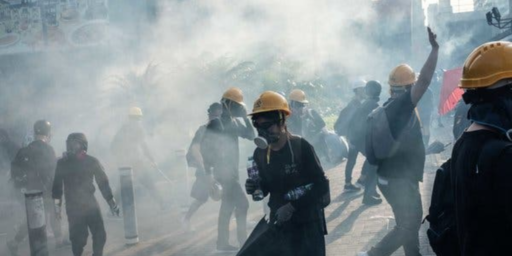
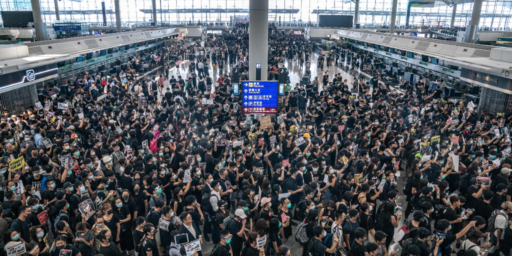
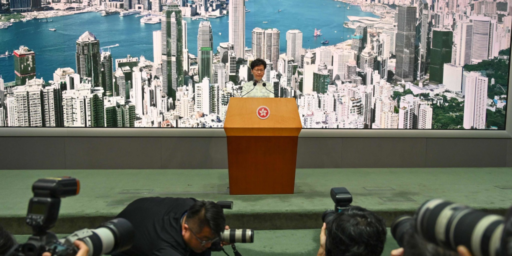
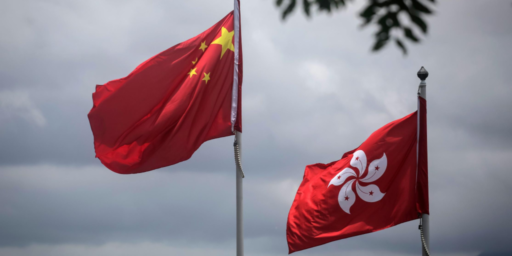
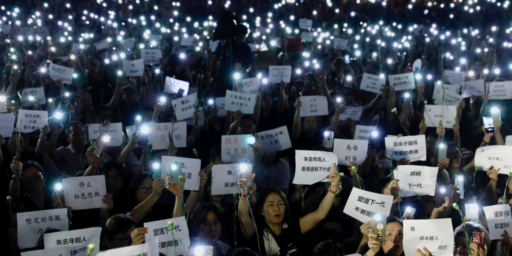
I don’t follow this as closely as I should, but I imagine that the Chinese leadership is keenly aware that Taiwan is watching.
Hong Kong’s pro-democracy parties sweeping pro-Beijing establishment aside in local elections
Not looking good for Xi